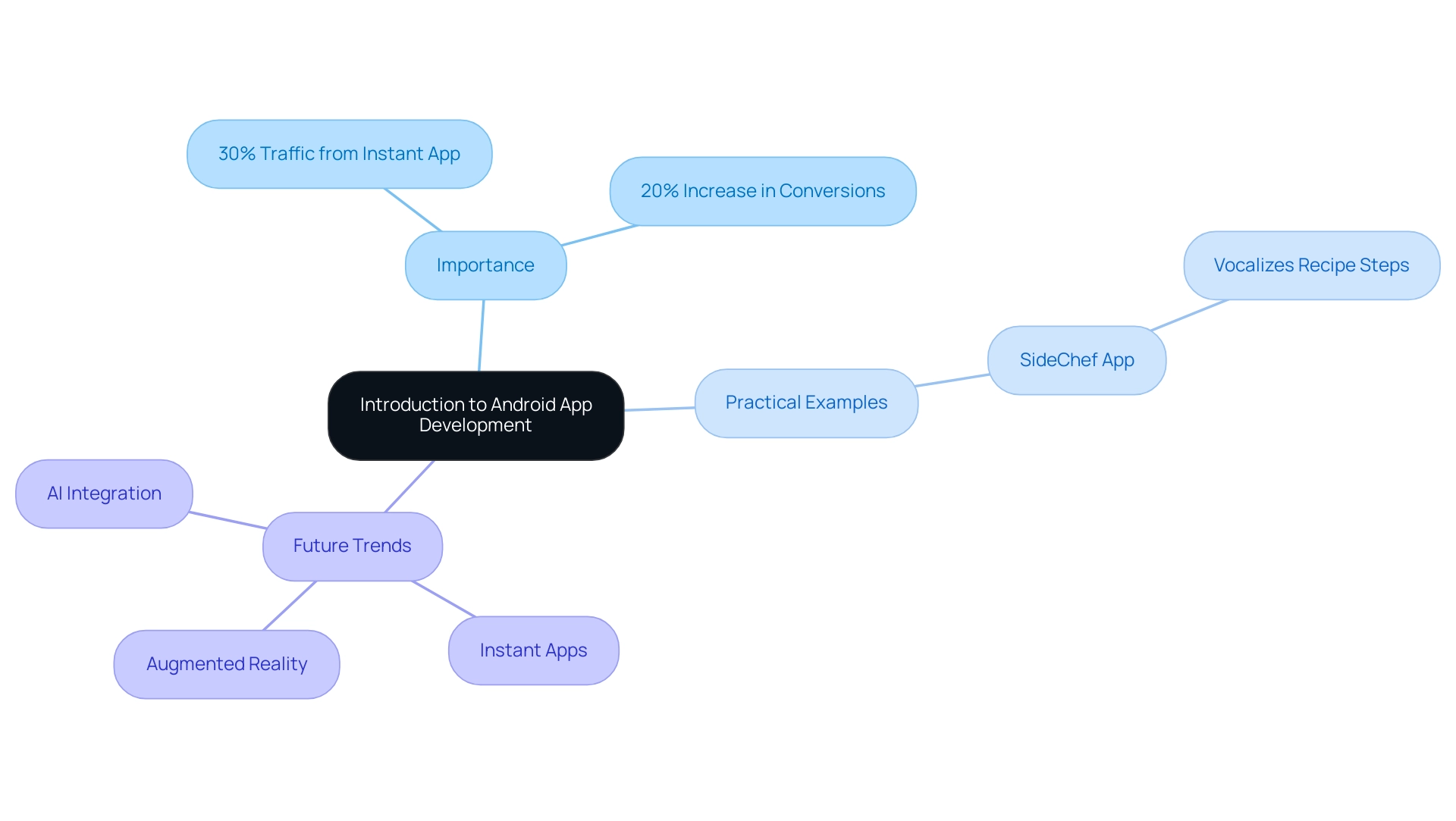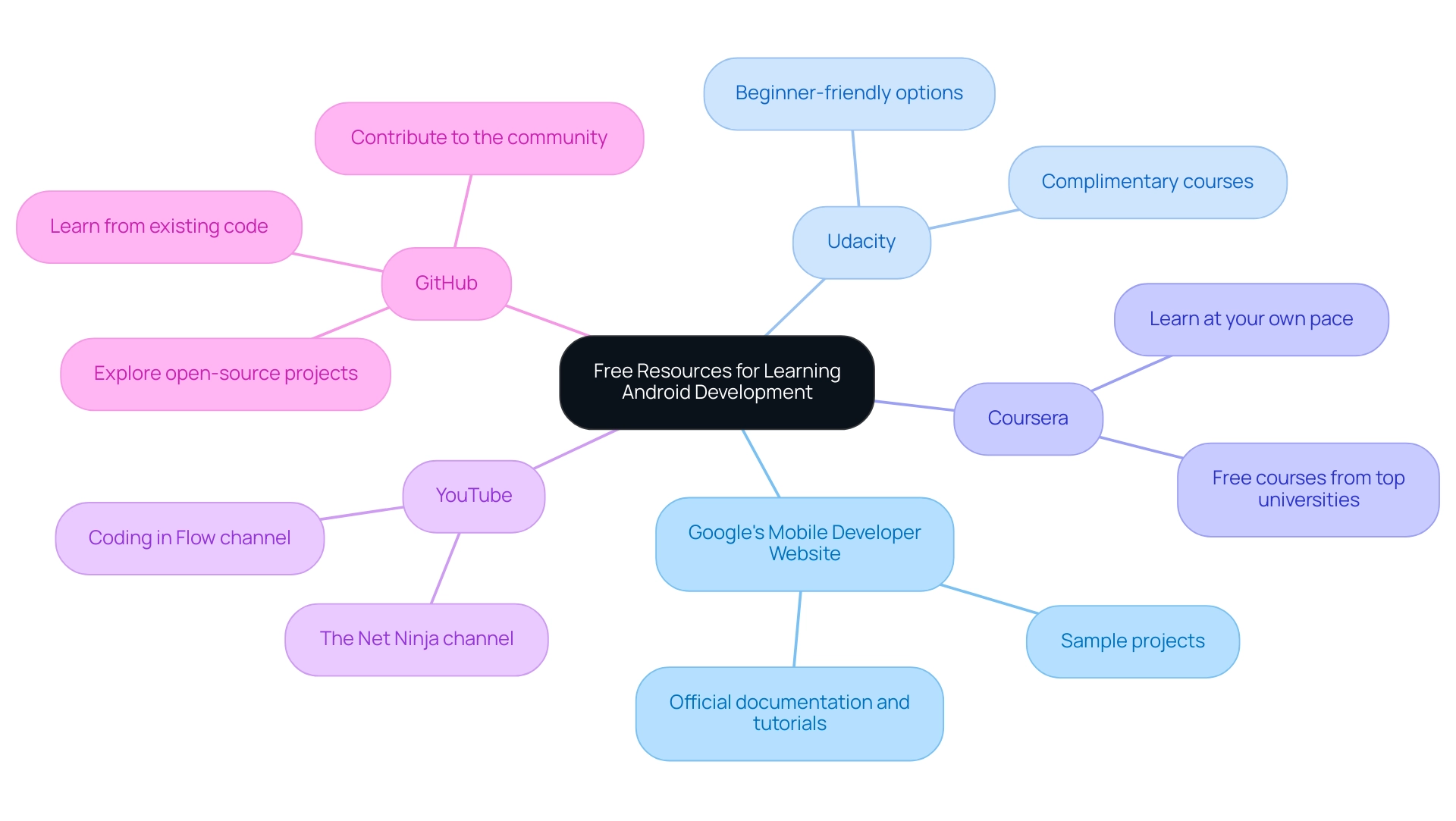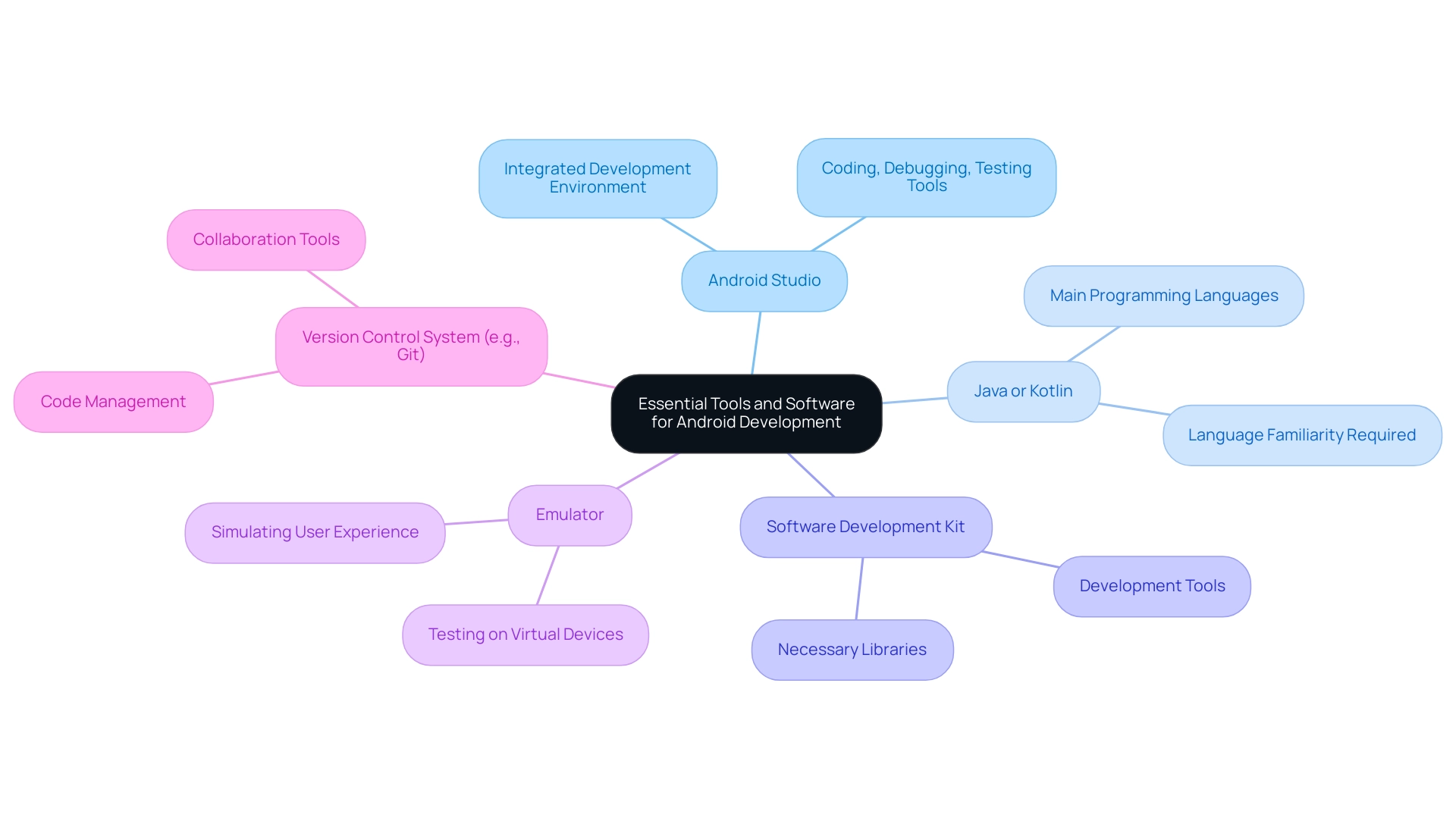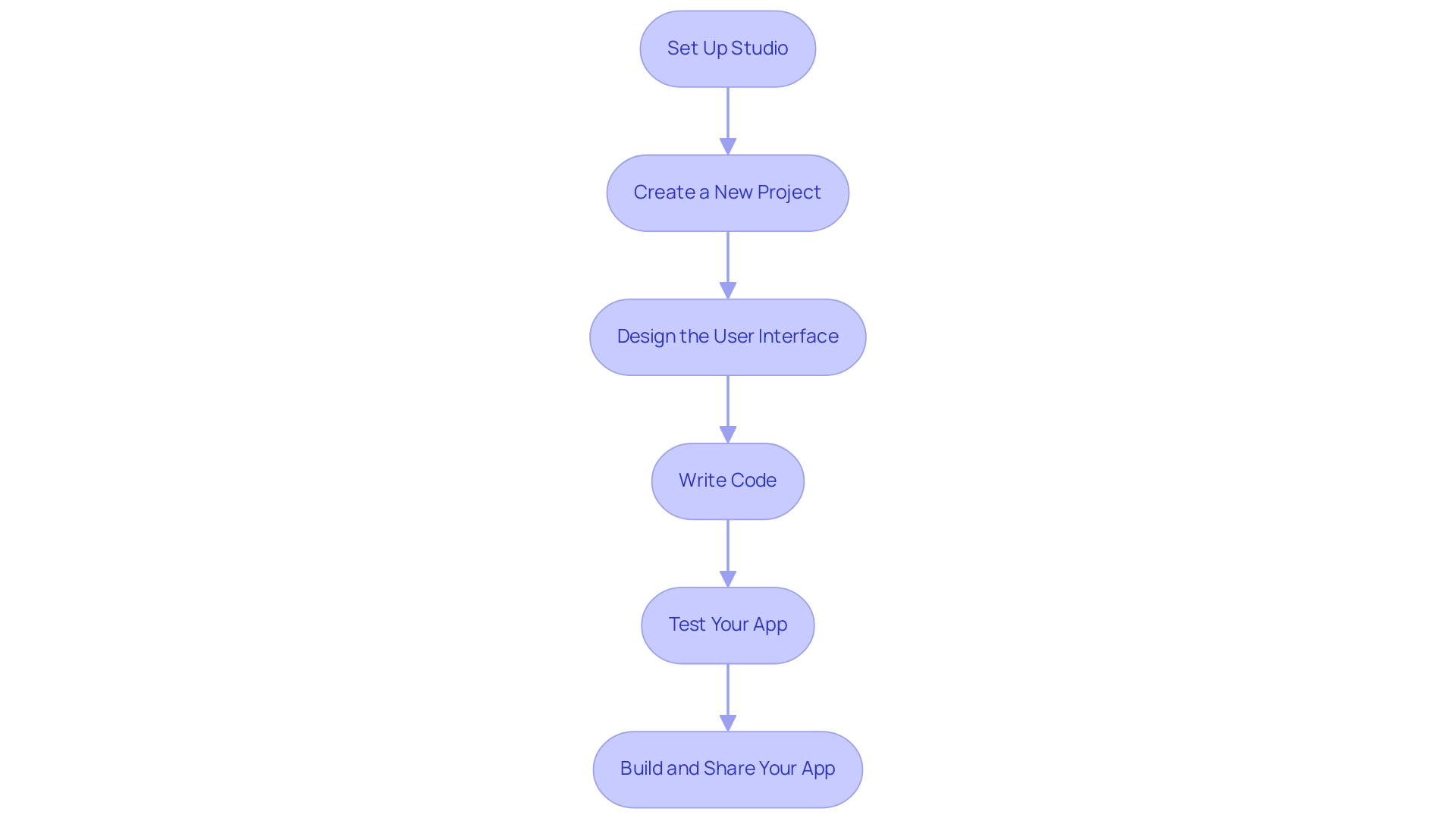Introduction
In the dynamic landscape of mobile technology, Android app development has emerged as a pivotal skill for aspiring developers and entrepreneurs alike. With the proliferation of smartphones and the growing demand for innovative applications, mastering this craft opens doors to a multitude of career opportunities. From enhancing user engagement through instant apps to integrating cutting-edge technologies like augmented reality and artificial intelligence, the potential for impactful app creation is vast.
This article delves into the essentials of Android app development, providing a comprehensive guide that encompasses everything from free learning resources and essential tools to a step-by-step approach for launching your first app. Whether one aims to join a forward-thinking company or create solutions that simplify everyday tasks, understanding the fundamentals of Android development is crucial for success in today's competitive marketplace.
Introduction to Android App Development
The development of software is the process of creating programs specifically for devices using the Android operating system. As mobile technology continues to evolve, this skill has become increasingly valuable, driven by the rapid growth of mobile commerce and the need for innovative applications.
For instance, statistics indicate that:
- 30% of Hollar's mobile traffic comes from their instant app, which allowed users to experience the app without installation.
- This feature resulted in a remarkable 20% increase in conversions, illustrating the effectiveness of thoughtful app design in enhancing user engagement.
Furthermore, the SideChef app demonstrates the practical uses of mobile development, as it vocalizes each step of the recipe while the individual is preparing food, highlighting how technology can enhance daily activities.
Looking ahead to 2024, trends indicate a growing emphasis on:
- Instant apps
- Augmented reality
- AI integration in mobile software
Learning to develop mobile applications opens a myriad of career opportunities, whether you aspire to join a forward-thinking company, launch your own enterprise, or design solutions that improve everyday life. By mastering the fundamentals of mobile application creation, you position yourself to develop solutions that meet user needs and drive your professional growth in a competitive marketplace.

Finding Free Resources for Learning Android Development
To begin studying mobile application creation at no cost, consider the following resources:
- Google's mobile developer website: Offers official documentation, tutorials, and sample projects.
- Udacity: Offers complimentary courses on mobile application creation, including beginner-friendly choices.
- Coursera: Features free courses from top universities, where you can learn at your own pace.
- YouTube: Channels like Coding in Flow and The Net Ninja provide extensive tutorials on mobile application creation.
- GitHub: Explore open-source projects to learn from existing code and contribute to the community.
These resources will provide you with the knowledge to start your journey in app creation without incurring costs.

Essential Tools and Software for Android Development
To develop mobile applications effectively, you will need the following essential tools and software:
- Android Studio: The official integrated environment for creating software for mobile devices, offering a comprehensive suite of tools for coding, debugging, and testing your programs.
- Java or Kotlin: Familiarize yourself with either Java or Kotlin, the main programming languages utilized for app development on mobile devices.
- Software Development Kit: Provides the necessary libraries and tools to develop mobile applications.
- Emulator: The development environment includes a simulator that allows you to test your apps on virtual devices.
- Version Control System (e.g., Git): Essential for managing your code and collaborating with others.
By establishing these tools, you'll be prepared to begin your mobile application creation journey.

Step-by-Step Guide to Your First Android App
Developing your first mobile application can be an exciting and rewarding endeavor. Follow these structured steps to ensure a smooth development process:
-
Set Up Studio: Begin by downloading and installing the latest version of the development environment on your computer. This integrated programming environment (IDE) is crucial for app creation on mobile devices. Once installed, launch the application and configure your development environment for optimal performance.
-
Create a New Project: Upon launching the development environment, select 'Start a new project in Studio.' Here, you can choose from various templates that cater to different app types. Name your project thoughtfully and set the desired API level to ensure compatibility with a wide range of devices.
-
Design the User Interface: Utilize the Layout Editor to create a visually appealing user interface. The development environment enables you to drag and drop UI components onto the design canvas. Customize each component's properties in the Attributes panel, focusing on user-centered design principles to enhance usability. As Martin Moravek, developer and founder of Minimalist Phone, states, "Utilizing my background in psychology and machine learning, I designed the minimalist phone app to discourage excessive screen time by customizing the user interface to be monochrome and less visually stimulating." This quote emphasizes the significance of thoughtful design in app creation.
-
Write Code: Navigate to the MainActivity.java (or MainActivity.kt) file to begin coding your app's functionality. Begin by incorporating basic functionalities to get accustomed to the coding environment. Keep in mind that iterative development is key; don’t hesitate to refine your code as you learn.
-
Test Your App: Utilize the Emulator to run and evaluate your app. This tool simulates a variety of device configurations, allowing you to assess functionality and user experience. Make necessary adjustments based on the results of your testing, as continuous iteration is crucial for app success. Statistics indicate that first-time mobile app developers who adhere to structured guidelines have a significantly higher success rate, with many reporting a 30% increase in confidence and creativity after completing their initial project.
-
Build and Share Your App: Once you are satisfied with the app's performance and design, proceed to build the APK file. This file can be shared with friends, or you may opt to publish it on the Google Play Store to reach a wider audience. A notable example is the Minimalist Phone app, developed by Martin Moravek in response to the overuse of social media during the COVID-19 pandemic. With an initial investment of $3,100, the app now generates around $240K annually and is on track to reach 500,000 downloads on Google Play.
By adhering to these steps and learning from successful case studies like Minimalist Phone, you will not only gain hands-on experience in Android app development but also increase your chances of success in this competitive field.

Conclusion
The journey into Android app development is both exciting and filled with opportunities, as highlighted throughout this article. Mastering the fundamentals equips aspiring developers with the skills necessary to create innovative applications that not only enhance user engagement but also meet the growing demands of the mobile market. From utilizing free resources to understanding essential tools like Android Studio and programming languages such as Java or Kotlin, the path to becoming a proficient developer is accessible and well-defined.
Furthermore, the step-by-step guide to building your first app underscores the importance of structured learning and iterative development. By following these guidelines, developers can create functional and user-friendly applications while drawing inspiration from successful case studies that exemplify the potential for significant impact and profitability in the mobile app landscape.
In conclusion, Android app development is not merely a technical skill; it is a gateway to a myriad of career opportunities that can shape the future of technology. As the industry continues to evolve with trends like instant apps and AI integration, embracing this craft will not only enhance professional growth but also empower individuals to contribute meaningfully to the digital ecosystem. Now is the ideal time to embark on this journey, harness creativity, and build solutions that simplify and enrich everyday life.





